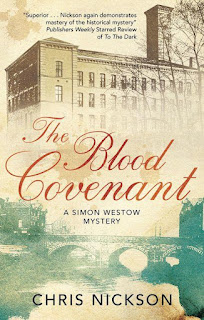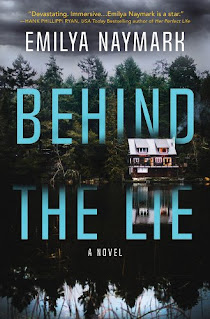 Simon Westow mysteries. He is
also a well-known music journalist. He lives in his beloved Leeds.
Simon Westow mysteries. He is
also a well-known music journalist. He lives in his beloved Leeds.
Nickson applied the Page 69 Test to The Blood Covenant, the latest Simon Westow mystery, and reported the following:
From page 69:Visit Chris Nickson's website.‘Sit down.’ Simon lit the oil lamp, trimming the wick until it gave a warm, wide light. A single room with a fireplace, table, two old wooden chairs. A cupboard for food and crockery. Stone sink. A stairway leading up to a bedroom. For a man on an overseer’s wage, he lived a very spare, modest life.Simon Westow, the thief-taker, has followed home Dawson, one of the overseers from the factory where two boys died, overwork and beaten. He’s there for some revenge and satisfaction – he was a boy in a factory himself once and has the scars.
‘You know who I am?’
Dawson nodded, terrified.
Simon moved behind him and began to speak: ‘When I was a boy, I was in the workhouse and they sent me to work in a mill …’
He made the man listen to it all. The pain, the humiliation, the things he saw. When he finished, the room seemed to be filled with sorrow.
Eventually Dawson asked, ‘What do you want me to say?’
‘I want to know why you beat those children and all the others.’
‘You know why.’
‘Tell me anyway,’ Simon said. ‘Make me understand.’
He coughed, stammered. ‘So they learn and remember to do it properly the next time.’
‘No.’ Simon shook his head. ‘There’s more to it than that, isn’t there?’ He leaned close and whispered in the man’s ear. ‘You enjoy it, don’t you?’
He kept pushing the man. He wanted Dawson to admit the pleasure he took in his work.
‘Yes, I like to see them scared,’ he said finally. ‘I like their pain.’
Dawson was a bully. A man who loved to show his strength by exercising power over children. No note of regret or guilt in his voice. To him, everything he’d done was natural.
‘If I don’t do it, someone else will,’ he said. He shrugged, folded his arms and sat back.
‘Then it’s going to be someone else, Mr Dawson,’ Simon told him, ‘because you won’t be doing it again. You need to understand something: that part of your life has ended.
He knows Dawson can’t do anything about the past, but he can use fear to make sure the man never does this again. It’s a small victory that he hopes will lead to a larger one over the factory owner, a step on the way. And to do it, he’s used the bully’s weapon on the bully.
It’s grim, but the book itself is dark, a story of the poor and the rich who exploit them – and trying to vanquish that.
Page 69 offers a fair reflection of the book, the conflict within it, although on a very small scale and any violence is hinted at, not explicit.
The Page 69 Test: The Constant Lovers.
The Page 69 Test: The Iron Water.
The Page 69 Test: The Hanging Psalm.
The Page 69 Test: The Molten City.
The Page 69 Test: Brass Lives.
--Marshal Zeringue



















